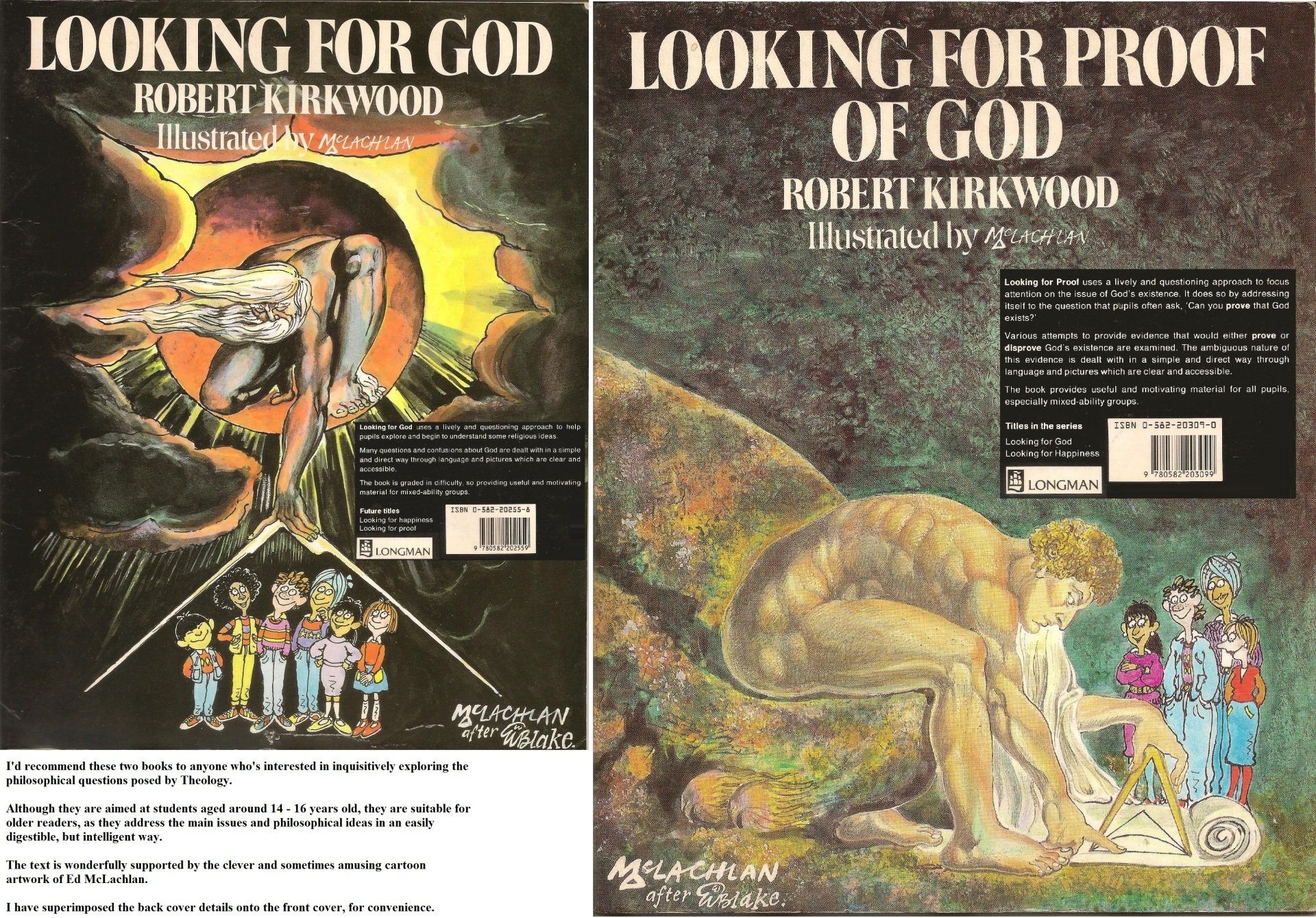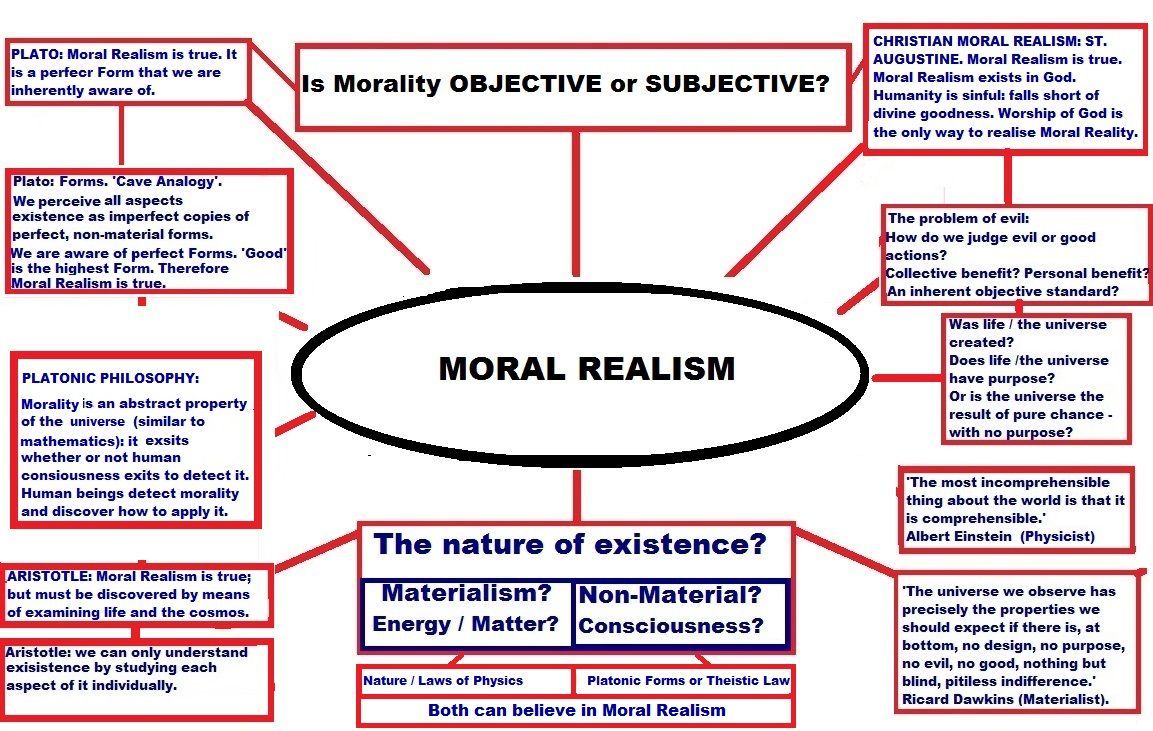
A lesson document overview of the complexity of the philosophical issue of Moral Realism.
©
Copyright: MLM Arts 15. 11. 2023

FREE WILL: At least partial ability to choose your actions...
Here's one to ponder...
Hard-line Scientific Materialists do not - cannot - allow that there is any such thing as Free Will - because, as far as they are concerned, only matter exists - and every material thing (from fundamental particles upwards) is controlled by the laws of Nature / physics; therefore everything that happens is determined in advance; everything happens in accordance with the infallible directions of the laws of Nature...
But, by my reckoning...
That means that Materialist cannot agree with Darwinian biological evolution: Darwinism...
Because Darwinism depends on mutation; incorrect copying of genes; flaw; error; random chance events: which may, by chance, suit environmental conditions...
That would mean fallibility in the direction of matter governed by the laws of Nature; it would mean that flaws happen; matter can behave in ways outside of the direction of the laws of Nature...
Now, that's not the action of Free Will and personal choice, of course, but it still shows that the behaviour of matter is not irresistibly governed by the laws of
Nature...
Which means that Darwinism is untenable for Scientific Materialists... Who generally accept it - but, unless I'm mistaken (and I might well be, but I can't see
how at this moment... ) - they really cannot...
So either Darwinism is wrong...
Or...
The Materialist assertion that Free Will doesn't exist, is wrong...
(I found this image online. My acknowledgement and thanks to whoever made it / owns it (identity unknown to me). ) (M).
Textual content: © Copyright: MLM Arts 14. 12. 2022. Edited and re-posted: 15. 12. 2022
PLATO'S CAVE ALLEGORY
AN INTRODUCTION TO THE PHILOSOPHY OF 'KNOWING' / HOW KNOWLEDGE IS ASSESSED...
Philosophy... It's daunting and, frankly can often be discouraging; I'll admit myself that when I first studied the subject (an overview course, as a compulsory unit in the first year of my undergraduate degree) I was initially perlexed by it...
I picked it up and performed quite well - and carried that into the third year, where another Philosophy unit was compulsory: this one a specialist area of the student's own choosing... And, always intent on broadening my perspective, I also opted for the course in Indian Philosophy (which is, I must say, far more satisfying and accessible - in my opinion... )
But Western / Greek rooted Philosophy, is the brain-racking, chin-stroking pursuit of the uncatchable: definitive answers to the questions of existence itself...
But, it's very good and necessary mental gymnastics - good brain training - or as I put I: 'Brain-Cruncher' activity...
This is an introduction to however can - or IF we can truly KNOW anything...
Look out for 'The Gettier Question'...
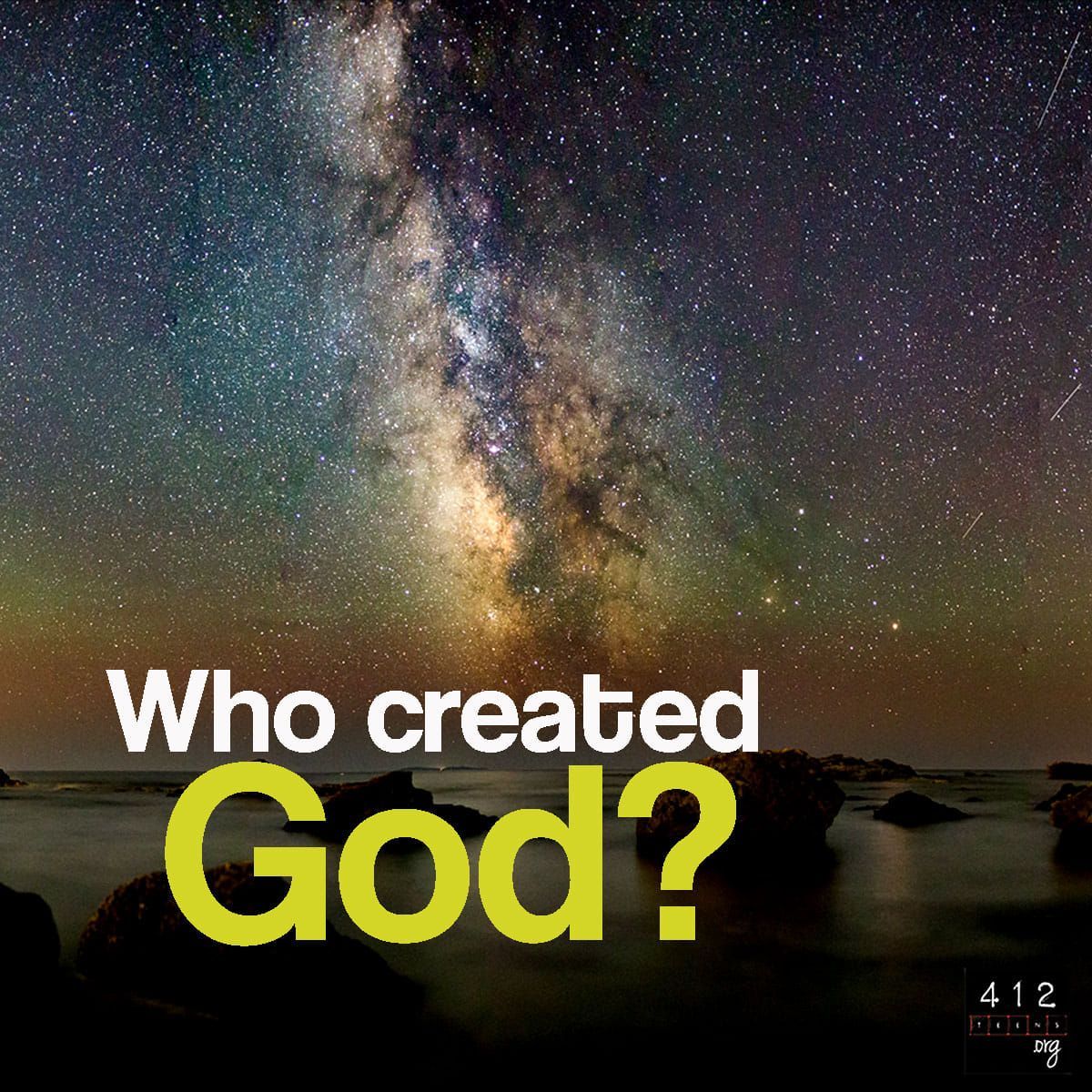
THE (JUVENILE) 'WHO / WHAT CREATED GOD?' Q:
A: God is eternal.
Why?
Because an eternally existing 'something' that created everything else is necessary.
Why?
Because if there was nothing that had necessary, non-contingent (uncaused) existence, then nothing would exist at all: because there'd be no necessity for anything to exist...
There ya go... Next time you see some dreary celeb blabber out that old chestnut, thinking its the argument winner - just slap it down easily with this...
(I found this image online. My acknowledgement and thanks to whoever made it / owns it (identity unknown to me.)
MLM Arts: 28. 06. 2023
RELIGIOUS STUDIES:
A program composed by The John Templeton Foundation and the University of Birmingham, UK.
This video describes a valuable new course that offers a modern, reasonable and intelligent analysis of the global and ancient phenomenon that is religion and all its associated areas of study.
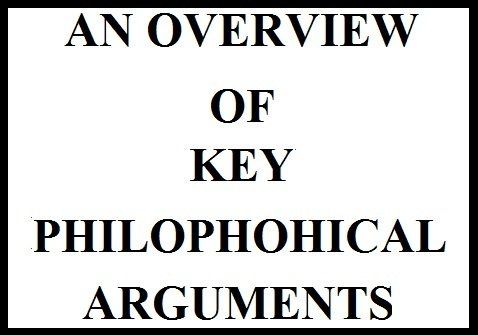
OVERVIEW OF KEY PHILOPHOHICAL ARGUMENTS
SOCRATES
Philosophy in the Western world dates its origins to the Greek philosopher, Socrates (there important were philosophers before him, referred to as ‘the pre-Socratic philosophers’, but Socrates is seen as the pivotal figure in the modern study of Western philosophy).
Socrates did not write down any of his ideas; what we know of Socratic Philosophy comes from accounts written down by his star pupil: Plato.
PLATO v. ARISTOTLE
These two philosophers from ancient Greece are the two main – and competing – sources for modern philosophical ideas in Western education.
Plato was Socrates’s star pupil, and among his other works, Plato recorded Socrates’s philosophical ideas.
Plato’s Republic is perhaps Plato’s most renowned work.
Two important aspects of Platonic Philosophy are: The Platonic Forms: which describes how the material world is only an imperfect projection of the perfect realm of true reality – which is non-material; and that human awareness of the concept of perfection means that we have an element to us that is perfect and from the perfect realm: that element being our soul.
Theses idea are demonstrated in Plato’s Cave Allegory – which will be described in this course. (See the YouTube video on this page, which describes Plato's Cave Allegory).
Aristotle was Plato’s star pupil. He challenged Plato’s ideas – and said that knowledge can only be reliable if it is based on observation based evidence.
LATER DEVELOPMENTS IN PHIOSPHY
ONTOLOGICAL (Basically: evidence for God that comes from reason / the mind– and not empirical evidence):
Saint Anselm (1033 – 1109) is most renowned for expressing this idea. The Ontological argument states that there must exists something that is the greatest thing in existence; and that this thing must exist in reality and not imagination, as truly existent things are greater than imagery things; therefore, if we can imagine an all-powerful, greatest entity in the universe, then for it to be truly the greatest thing in existence, it would have to exist in reality. This entity is God.
Descartes (1596 – 1650) is a later exponent of the Ontological Argument; his reasoning being, that finite beings cannot be considered to have true existence – only infinite beings; therefore, to consider ourselves to be existent, we must consider existence to be infinite.
Descartes’s most famous quote is: ‘I think, therefore I am’: which means that only the mind can be considered to have true existence, and that it must be infinite and eternal.
TELELOGICAL
Evidence by design in nature. Best known example: William Paley’s Watchmaker Argument:
If someone find an old fashioned mechanical watch, and they have never seen a watch before, then by examining this unknown item closely they’d have to conclude that it was made by someone – and that it has a purpose.
COSMOLOGICAL(Based on Aristotelean ideas of observable empirical evidence – and deduction):
Best known example:
The Kalam Cosmological Argument:
Everything that began to exist was created by something else before it.
The Universe began to exist.
Therefore the Universe had a creator.
This doesn’t say anything about what that creator is, however; the discussion then moves to an examination of the Universe and its properties to attempt to know something about its creator.
In modern times, the best known proponent of the Kalam Cosmological Argument is Dr. William Lane Craig.
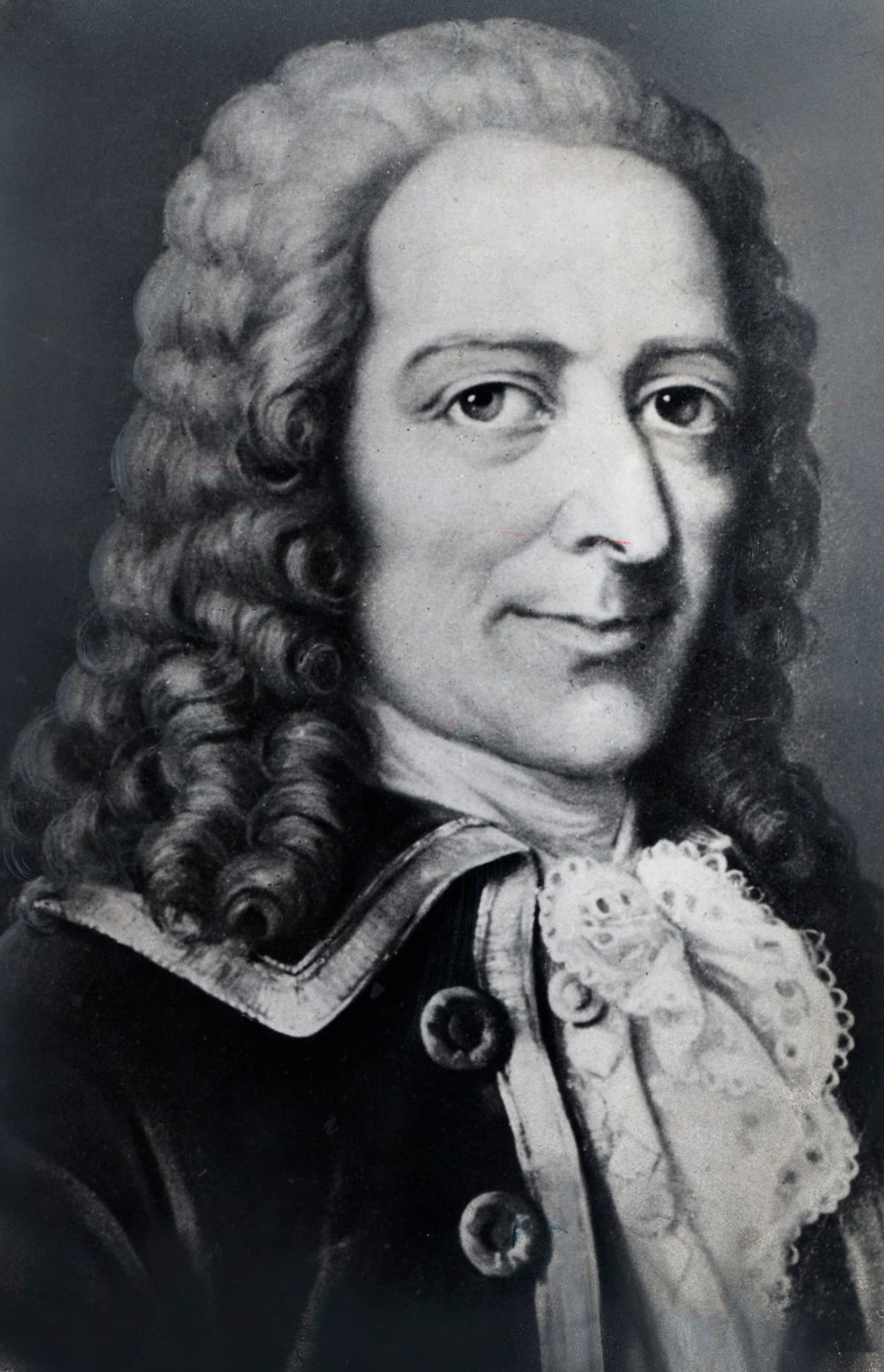
Voltaire (1694 - 1778) Enlightenment philosopher:
"What is faith? Is it to believe that which is evident? No. It is perfectly evident to my mind that there exists a necessary, eternal, supreme, and intelligent being. This is no matter of faith, but of reason."
Voltaire was a deist; which I must consider to be a type of theism: deism refers to a divine creator (as described above, by Voltaire), which is indistinguishable from the belief God in that respect.
But deists / deistic theists (?) do not believe that God is active in the World / Universe.
Many atheists therefore mistakenly assert that the God of deism abandoned the earth and humanity after creating the Universe.
However, Voltaire simply, but effectively explains the actions / relationship of God towards humanity in the story 'Candide', when Candide and his valet reach the legendary lost kingdom, El Dorado, and, asking an old wise man about the inhabitants' belief in God - and how they celebrate that, they are told:
"We do not pray st all. We have nothing to ask of God. He has given us all we want, and we unceasingly give Him thanks."
This describes how God created the World and the Universe - and humanity - and equipped humanity with all the necessary skills and resources to make the best of it. If the World is messed up - that's down to us; we must work harder, think more clearly, and use all that's best about being human - to make the best of the abundance of skills and resources that God has provided...
Voltaire's issues were with organised religion and religious dogma.
(I found this image online. My acknowledgement and thanks to whoever made it / owns it (identity unknown to me). ) (M).
Textual content:
©
Copyright MLM Arts 30. 04. 2023. Edited and re-posted: 05. 05. 2023
METAETHICS:
This is an excellent, easily digestible video on the subject of METAETHICS: discussion what is meant by ETHICS.


The point about the futility of trying to describe what's meant by 'all good' in material terms and to people who only know material points of reference, is that those people (and by this I mean everyone: us too, living today) cannot possibly understand it; they can only discuss some vague approximation of what they think 'all good' means: based entirely on their material knowledge and experiences.
A SOURCE RECOMMENDATION:
CLOSER TO TRUTH
(YouTube channel. Presented by neuroscientist Robert L. Khun)
The most (possibly the only?!) balanced and mature, intelligent YouTube source for the study of (what are referred to in education as) 'The Big Questions': the questions regarding understanding existence itself - and all aspects of it - on social media, is this, in my opinion.
Robert L. Khun is a highly qualified and respected neuroscience; he is at core a materialist (everything is explainable in purely material terms), but admits that he would like to be persuaded that there's more to existence than that... Or, alternatively, to have his materialism confirmed... Whichever the result may be...
The mystery of consciousness is his main subject of fascination...
So he has set out to interview some of the best and most qualified thinkers from all fields of study - to give their ideas...
No matter who they are, Khun questions them amicably, fairly and rigorously - giving every idea an equal say...
In this one, Canadian philosopher, J. L. Shellenberg, an atheist, but one who promotes scepticism in a positive way: in saying that it should open minds to possibilities - not narrow or close them (the latter being what modern scepticism has largely been reduced to, in my opinion), discusses ways to consider consciousness...
The whole Closer To Truth channel is very worth watching...

This is very relevant to the ranting debate that rages on between anti-religion (often ex-Christians) and fundamentalist Bible believing Christians... Both of whom seem to think that Bible inerrancy is vitally important to the questions of the validity of the Bible - and whether or not God exists...
When in fact, it's utterly irrelevant - when you know that no claim to inerrancy is made by anyone anywhere...


THE DOGMA OF SCIENTIFIC MATERIALISM...
It's a commonly blustered-out line these days:
Science[by which those who say this mean, not Science per se, but the brute simplicity of the Materialism paradigm of Science] can explain pretty much everything thing now...'
From that, they bluster the frankly ridiculous 'God of the gaps' retort to theists: which says that theists can only use God an an explanation for things that
(Materialist) Science can't explain...
It's absurd, of course: it's saying that, by using the only property that we have that can
look for intelligibility - our intelligence - to detect intelligibility - and recognise it as intelligible - we must therefore conclude that the only explanation for it that can be
DISCOUNTED is... intelligence....
...And that theists are left with the rest to call the work of God: the work of intelligence...
'The God of the gaps' bluster really is as absurd as that...
Nope. Actually, it's accurate to say that: Science can explain everything - except... EVERYTHING...
The attitude of Science today can be summed up by Terence McKenna:
'Give us one free miracle and we'll explain the rest'...
The 'one free miracle' being the very existence of everything: existence itself...
(I found this image online. It is labelled PonderAbout.com. My acknowledgement and thanks to them.)

This quote by G K Chesterton shows the depth of the problem of discussing what exactly is meant by 'reality': what it is; how / if we can know it...
The problem is greater, of course, with any purely Materialist attempt at understanding the issue. As C S Lewis put it:
"...Supposing there was no intelligence behind the universe, no creative mind. In that case, nobody designed my brain for the purpose of thinking. It is merely that when the atoms inside my skull happen, for physical or chemical reasons, to arrange themselves in a certain way, this gives me, as a by-product, the sensation I call thought. But, if so, how can I trust my own thinking to be true? ..."
C. S Lewis 'The Case For Christianity' (1943)
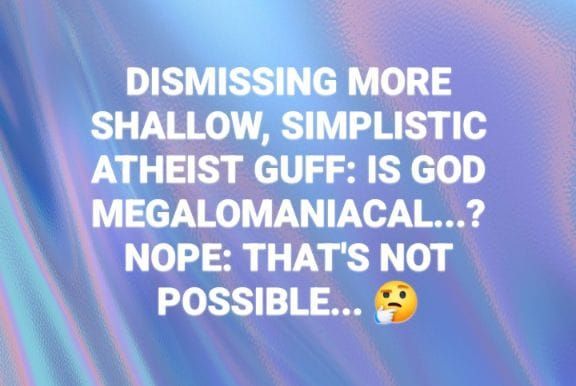
JUST ANOTHER QUICK PUT DOWN OF POPULAR ATHEIST GUFF... 😏
'GOD IS MEGALOMANIACAL' 😅
NOPE: GOD CANNOT POSSIBLY BE MEGALOMANIACAL... 😏
...However, anyone accusing God of being so, has themself - ironically - displayed megalomaniacal characteristics. 😏
In Richard Dawkins' shallow, simplistic atheist pamphlet, The God Delusion, one of the accusations that Dawkins levels against the (fictitious, in his estimation) God of the Judeo-Christian Bible, is that He is 'megalomaniacal': obsessed with the desire for power. To quote the definition in the Oxford English Dictionary:
'...a mental illness that causes someone to have an exaggerated sense of their own power or importance...'
To apply this accusation against the understanding of what the Judeo-Christian God is, is of course absurd.
God, in the Judeo-Christian understanding, cannot have an exaggerated sense of His own power and importance: He IS power: the source of all power and all existence.
God has no superior; nothing and no-one to answer to.
Everything that exists, exists because of God and is answerable to God.
A person or entity can only have 'an exaggerated sense of their own power and importance' if there is something or someone more important than they are; or some rival or equal: against which a 'sense of power and importance' can be measured.
Megalomaniacal behaviour is entirely the province of the finite and limited.
God cannot possibly be megalomaniacal. 🙄
But...
Any finite and limited person or entity presuming to have the authority to condemn and accuse an entity of infinite and limitless power, can, therefore, reasonably be described as 'megalomaniacal': having an exaggerated sense of their own power and importance.
It just takes a bit of thinking it through... 🤔
Unfortunately, and tediously, I invariably find that the most fanatical anti-religion and atheist types never do properly think through their shallow, simplistic rants... 😏
(I found this image online. My acknowledgment and thanks to whoever posted it / owns it (identity unknown to me). 🙂)
Textual content: © MLM Arts: 03. 02. 2025. Edited and re-posted: 05. 01. 2025
